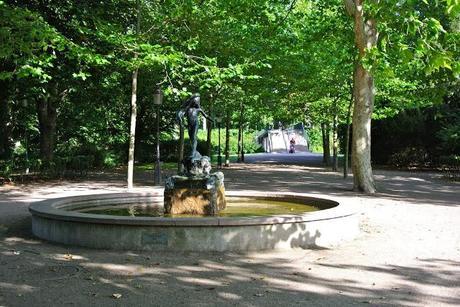
{Slottsparken - Malmö, Sweden}
You could say some are natural disasters, outside of human error, but in most cases, it's people who've cause nature to become unbalanced in the first place. And then there are those that generously provide us someone to blame. Whether we consider them terrorists or mentally ill, they've used force to cause harm. In many cases, that force has been amplified by guns. The debate comes in waves---whether or not or we should control guns, how they're sold and used. Words like "freedom" and "protection" are used carelessly, and they're oftentimes listened to, because the world is scary, and dangerous, and bad things keep happening.Here I am, living abroad, digesting these events from multiple perspectives and news sources. More than one European has told me they'd be nervous to go to the States--what with all our surveillance, and guns, and craziness. This is the only news they hear; much like those in the U.S. would most likely immediately associate Haiti with an earthquake and Rwanda with a genocide. Americans who are informed about those tragic events anyhow; which you may be aware, some are not.
I cannot even express how heartbreaking it all is.
Because here's the thing: I believe we are good. I believe we are capable of being good and doing good and spreading good. I simply cannot accept that human beings, American or not, are born with evil ignorance in our hearts. Our misinformed reasons for participating in tragedies, for causing them, must result from the conditioning of unfortunate life experience.
And so, I beg of you, please... be kind---to yourself, to your family, to your friends, to those you have no reason to be kind to.
"But why?" you might protest. "When there is so much hate and fear and hate, how could I possibly approach a stranger with kindness?"
Alas, I'm afraid, I don't have the answers to such questions. Then again, I'd probably reply with this: what's the harm in trying?
You might even consider it in your best interest...
(Read the complete 2013 Syracuse University convocation speech by George Saunders here.)
"What I regret most in my life are failures of kindness.
Those moments when another human being was there, in front of me, suffering, and I responded…sensibly. Reservedly. Mildly.
Or, to look at it from the other end of the telescope: Who, in your life, do you remember most fondly, with the most undeniable feelings of warmth?
Those who were kindest to you, I bet.
It’s a little facile, maybe, and certainly hard to implement, but I’d say, as a goal in life, you could do worse than: Try to be kinder.
Now, the million-dollar question: What’s our problem? Why aren’t we kinder?
Here’s what I think:
Each of us is born with a series of built-in confusions that are probably somehow Darwinian. These are: (1) we’re central to the universe (that is, our personal story is the main and most interesting story, the only story, really); (2) we’re separate from the universe (there’s US and then, out there, all that other junk – dogs and swing-sets, and the State of Nebraska and low-hanging clouds and, you know, other people), and (3) we’re permanent (death is real, o.k., sure – for you, but not for me).
Now, we don’t really believe these things – intellectually we know better – but we believe them viscerally, and live by them, and they cause us to prioritize our own needs over the needs of others, even though what we really want, in our hearts, is to be less selfish, more aware of what’s actually happening in the present moment, more open, and more loving.
So, the second million-dollar question: How might we DO this? How might we become more loving, more open, less selfish, more present, less delusional, etc., etc?
Well, yes, good question.
Unfortunately, I only have three minutes left.
So let me just say this. There are ways. You already know that because, in your life, there have been High Kindness periods and Low Kindness periods, and you know what inclined you toward the former and away from the latter. Education is good; immersing ourselves in a work of art: good; prayer is good; meditation’s good; a frank talk with a dear friend; establishing ourselves in some kind of spiritual tradition – recognizing that there have been countless really smart people before us who have asked these same questions and left behind answers for us.
Because kindness, it turns out, is hard – it starts out all rainbows and puppy dogs, and expands to include…well, everything.
One thing in our favor: some of this “becoming kinder” happens naturally, with age. It might be a simple matter of attrition: as we get older, we come to see how useless it is to be selfish – how illogical, really. We come to love other people and are thereby counter-instructed in our own centrality. We get our butts kicked by real life, and people come to our defense, and help us, and we learn that we’re not separate, and don’t want to be. We see people near and dear to us dropping away, and are gradually convinced that maybe we too will drop away (someday, a long time from now). Most people, as they age, become less selfish and more loving. I think this is true. The great Syracuse poet, Hayden Carruth, said, in a poem written near the end of his life, that he was 'mostly Love, now.'”

